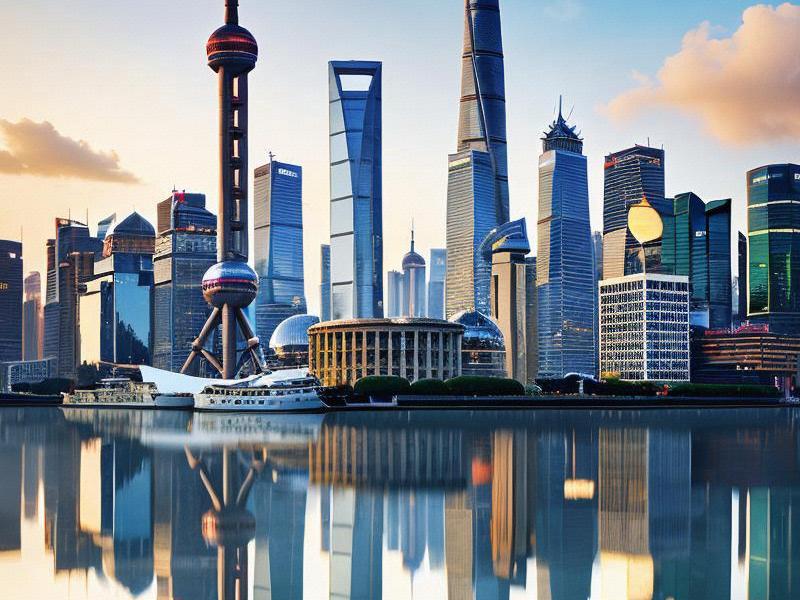
Nestled along the eastern coast of China, Shanghai stands as a beacon of modernity and a living testament to the country's remarkable journey of economic reform and urbanization. Once a modest fishing village, Shanghai has risen to prominence as one of the world's most dynamic and influential cities, embodying the spirit of China's rapid transformation.
The city's history dates back over two millennia, with its strategic location at the mouth of the Yangtze River making it a crucial hub for trade and commerce. During the 19th century, Shanghai became a treaty port, opening its doors to foreign influence and investment. This period saw the emergence of the International Settlement and the French Concession, areas where Western architecture and culture flourished alongside traditional Chinese elements.
The Bund, a historic waterfront promenade, stands as a symbol of Shanghai's colonial past. Once lined with opulent buildings of various nationalities, the Bund now offers a picturesque view of the futuristic skyline of Pudong across the Huangpu River. This juxtaposition of old and new is a recurring theme in Shanghai, reflecting the city's ability to seamlessly blend its rich history with cutting-edge modernity.
In the latter half of the 20th century, Shanghai experienced a period of relative stagnation as China underwent significant political changes. However, the economic reforms initiated in the late 1970s marked a turning point for the city. As China embraced market-oriented policies, Shanghai was poised to reclaim its position as a leading economic powerhouse.
The establishment of the Pudong New Area in 1990 was a pivotal moment in Shanghai's modernization. Once a rural area, Pudong has since transformed into a bustling financial district, home to some of the world's tallest skyscrapers, including the iconic Oriental Pearl Tower and the Shanghai Tower. The Lujiazui Financial District, located in Pudong, has become a global financial hub, attracting multinational corporations and international organizations.
上海花千坊龙凤 Shanghai's rapid urban development is not limited to its skyline. The city has invested heavily in infrastructure, transportation, and public services to accommodate its growing population and enhance the quality of life for its residents. The Shanghai Metro, one of the most extensive and efficient metro systems in the world, provides seamless connectivity across the city, reducing traffic congestion and promoting sustainable urban living.
The city's commitment to sustainability is evident in its efforts to reduce carbon emissions and promote green spaces. Initiatives such as the construction of the Shanghai World Expo Park, which hosted the 2010 World Expo, have showcased the city's dedication to environmental conservation and innovation. The Expo Park has since been transformed into a vibrant cultural and recreational area, attracting millions of visitors annually.
Culturally, Shanghai is a melting pot of diverse influences. The city's history as a treaty port has left an indelible mark on its architecture, cuisine, and lifestyle. The French Concession, for instance, is home to charming cobblestone streets, elegant villas, and cafes that transport visitors to another era. Similarly, the Yu Garden, a classical Chinese garden, offers a serene escape from the bustling city life, showcasing traditional Chinese aesthetics and craftsmanship.
Shanghai's culinary scene is a testament to its cultural fusion. From traditional Shanghainese dishes like xiaolongbao (soup dumplings) and shengjianbao (pan-fried buns) to international cuisines, the city offers a gastronomic experience that caters to all tastes. The vibrant night markets and bustling food streets are a testament to the city's culinary diversity and vibrancy.
上海私人外卖工作室联系方式 The arts and culture scene in Shanghai is thriving, with numerous museums, galleries, theaters, and cultural institutions showcasing the city's rich heritage and contemporary creativity. The Shanghai Museum, renowned for its extensive collection of Chinese art, attracts art enthusiasts from around the world. The city's vibrant theater scene, featuring everything from traditional Chinese opera to contemporary plays and musicals, reflects its dynamic cultural landscape.
Education is another area where Shanghai has made significant strides. The city is home to some of the country's top universities, including Fudan University and Tongji University, which attract students from across China and abroad. Shanghai's commitment to education and innovation has positioned it as a global leader in research and development.
As Shanghai continues to grow and evolve, it faces challenges such as managing urban sprawl, ensuring sustainable development, and preserving its historical and cultural heritage. The city has implemented various strategies to address these challenges, including smart city initiatives, urban planning policies, and cultural preservation projects.
One notable example is the Shanghai Urban Planning Exhibition Center, which showcases the city's urban development plans and promotes public participation in the planning process. The center provides a platform for residents to learn about the city's future vision and contribute their ideas, fostering a sense of community and shared responsibility.
上海娱乐 Shanghai's international profile has also expanded significantly in recent years. As a member of the World Expo Cities Network and a host city for major international events, Shanghai has become a global platform for cultural exchange, business cooperation, and innovation. The city's strategic location and robust infrastructure make it an ideal hub for international trade and investment.
The Belt and Road Initiative, launched by China in 2013, has further enhanced Shanghai's role as a global city. As a key node in the initiative, Shanghai is playing a crucial role in promoting connectivity and cooperation among countries along the Silk Road Economic Belt and the 21st Century Maritime Silk Road.
In conclusion, Shanghai's renaissance is a story of transformation, resilience, and innovation. From its historic roots to its modern-day achievements, the city exemplifies the spirit of China's rapid development and its commitment to becoming a global leader. As Shanghai continues to evolve, it remains a city of contrasts and possibilities, offering a unique glimpse into the future of urbanization and cultural fusion.
